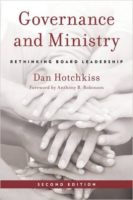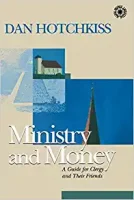Last March as we began to realize the seriousness of the COVID-19 pandemic, congregations entered a creative frenzy. We found ways to offer worship, pastoral care, group fellowship, and education online. Long-range plans went out the window as we rose to short-term challenges.
Governing boards—even those that generally spend time planning and discerning—have understandably become preoccupied with short-term matters. Board members are busy finding groceries, caring for children out of school, and helping out with this or that around the congregation. But “this or that” is not the work of governance. Eventually boards and clergy leaders must return to their core work and formulate a fact-based and compelling vision of the congregation’s future.
I sympathize! Over the last month I’ve had my hands full simply getting from one day to the next. My consulting trips are all on hold. Suddenly I am the tech assistant for my church’s music program. Like many people, I have trouble planning beyond two or three days because I am preoccupied with the details of life in this strange time.
As our awareness of the crisis reaches the two-month point, it’s time to ask, “What should the board be doing now?” Most boards know they should be thinking about the congregation’s future—but in this time, when so much about our future is unknown, it’s hard to frame the conversation. Drawing on experience getting boards to plan ahead, I’ve drafted a few questions you might use to help your board to look ahead a little further.
1. What are we learning during this pandemic time?
Congregations have worked hard over the last few weeks to invent new ways to do the things they did before. And some have had considerable success at it—especially those that were online before the epidemic. But let’s face it: this virus strikes at the heart of what we do. Physical presence is at the heart of most congregations’ work. We can worship virtually, conduct weddings, hold small-group ministries, and offer education classes online. Even memorial services can take place virtually. But it’s not the same.
Even as I work to take my home church online, I’m aware how much we rely on social capital from pre-coronavirus days. Choir members can record their voices one by one, and someone can assemble the result into a single stream—but no one would learn singing that way. Likewise for worship: most Zoom services are simulations that depend for their effectiveness on memories of former times.
No matter how we try to make online events just like in-person ones, they are and will be different—touching people in new ways. So many differences: people can participate from far away, the preacher and musicians sound wobblier, and leaders have the power of Mute!
When we can’t do what we are used to doing, we have a chance to learn something about what difference we are making, and to whom. A board that cares about the congregation’s mission takes advantage of this opportunity by paying attention to attendance numbers, giving patterns, and feedback—formal and informal.
Spend time with this information in board meetings and capture the result of your discussion. Think of qualitative and quantitative data you could gather that will help you learn, and then return to the same conversation when you meet again. Remember that a congregation’s “bottom line” is not found on the treasurer’s report—important as that is—but in the hearts you touch. Don’t let the press of urgent business crowd out the board’s primary concern.
2. What has changed, and for how long?
In this time, we face not simply major changes but uncertainty about how long the changes will last. Some people believe social distancing will be a lasting feature of our lives, while others scoff at health measures now in place. A lot of people seem to think life will go back to normal at the expiration of the current shelter-in-place order. Political polarization tends to exaggerate such differences.
As a result, some board members may be nervous about venturing their thoughts about the future. I would raise this issue up front: “We know that right now, we can’t hold worship services or other gatherings in person. We don’t know for sure how long current restrictions will last, or whether they’ll be modified at some point. We hold a range of viewpoints on these questions. Let’s talk about the range of possibilities each of us expects, to get a sense of the uncertainty we’re living with.”
Ask people to respond individually to several questions. If you are using Zoom, you might construct a survey (what Skype and Google Hangouts call a poll). You might ask, “How long before we can open up the church for public worship?” “How will people’s willingness to attend worship change even after the restrictions lift?” “How much will our congregation’s income be affected by this epidemic?”
Remember that the goal is not to resolve these questions, but to identify the range of answers that seem possible to each board member and the board as a whole. You may have one or more board members who believe they know exactly how the COVID-19 crisis will play out. If so, the board will need to ask those members to accept that it will proceed based on the range of possibilities the whole group sees, not one member’s certainty.
Having sketched the range of possibilities the board finds credible, a next step is to construct scenarios to help with planning. This is a big step; not every board is ready yet. But by the end of the summer, your people will expect their leaders to have risen above day-to-day emergencies to work on finding a future for the congregation and its ministry.
3. What scenarios can we construct to guide our planning?
Each scenario should fall within the range of possibilities the board found credible in steps 1 and 2. None of your scenarios will happen exactly. Still, it’s helpful to be fairly specific, because people respond more creatively to a scenario they can imagine vividly.
- One scenario might be, “We open in September, but 20% of our congregation do not return, and giving from our current members will fall off by 20%.”
- Another might say, “We will need to continue virtual worship for at least a year, but will be able to reintroduce small gatherings, with appropriate safeguards, in September. Giving from current members will decline by 30%.”
- A third scenario might say, “We will become so proficient at virtual worship that attendance will increase by 20%. Any decline in current-member giving will be made up by newcomers who will give online.”
Your scenarios will be different from these, because they will fall within the range of possibilities your board finds reasonable. You may construct only two scenarios, or four. I encourage you to let the congregation know about your scenarios once you have completed them. This takes a certain amount of courage, and may challenge some board members who believe that leaders should be silent till they know all the answers, or who are afraid of the anxiety that hard questions can produce.
Decisions of this kind are not for boards to make in isolation. Boards should work closely with the congregation’s spiritual leaders and with members of the congregation, especially those on whose support success depends. The board’s role is to frame the questions in a form that allows others to participate, and to take responsibility for moving the discussion forward.
Transparency gives members notice that you may need to make significant adjustments and enlists their creativity in discerning how you will respond. And that’s the next step—to flesh out possible decisions that the board might make.
4. How will we fulfil our mission under each scenario?
When faced with a rapidly changing environment, the easy thing for any board to do is to stay the course, praising staff and volunteers who make the new situation feel as familiar as possible. This makes people happy in the short run, but risks squandering the resources that might make renewal possible by dragging out the status quo.
This is not work for the board to do in isolation, or just with the top clergy leader. It should enlist congregants and staff to gather data, flesh out options, evaluate and update the likelihood of each scenario, reflect, and pray about what God would want if God could vote at meetings. Choosing the most faithful way forward is uncomfortable work because it raises questions about cherished aspects of a congregation’s life.
For these reasons, it is helpful to set a timeline for this stage of the board’s work. Uncertainty won’t go away, but if the board commits to making some strategic choices by a certain date, that will go a long way toward reducing the anxiety this kinds of planning raises.
A board that cares about its mission has the courage to let go of old ways in new circumstances. To do this faithfully, the board must step back and take a wider view of what the mission really is—distinct from the familiar ways of trying to accomplish it. This work is not easy, but in this second stage of our coronavirus crisis, it is what governing boards are called to do.
Dan Hotchkiss has consulted with a wide spectrum of churches, synagogues, and other organizations spanning 33 denominational families. Through his coaching, teaching, and writing, Dan has touched the lives of an even wider range of leaders. His focus is to help organizations engage their constituents in discerning what their mission calls for at a given time, and to empower leaders to act boldly and creatively.
Dan coaches leaders and consults selectively with congregations and other mission-driven groups, mostly by phone and videoconference, from his home near Boston. Prior to consulting independently, Dan served as a Unitarian Universalist parish minister, denominational executive, and senior consultant for the Alban Institute.



